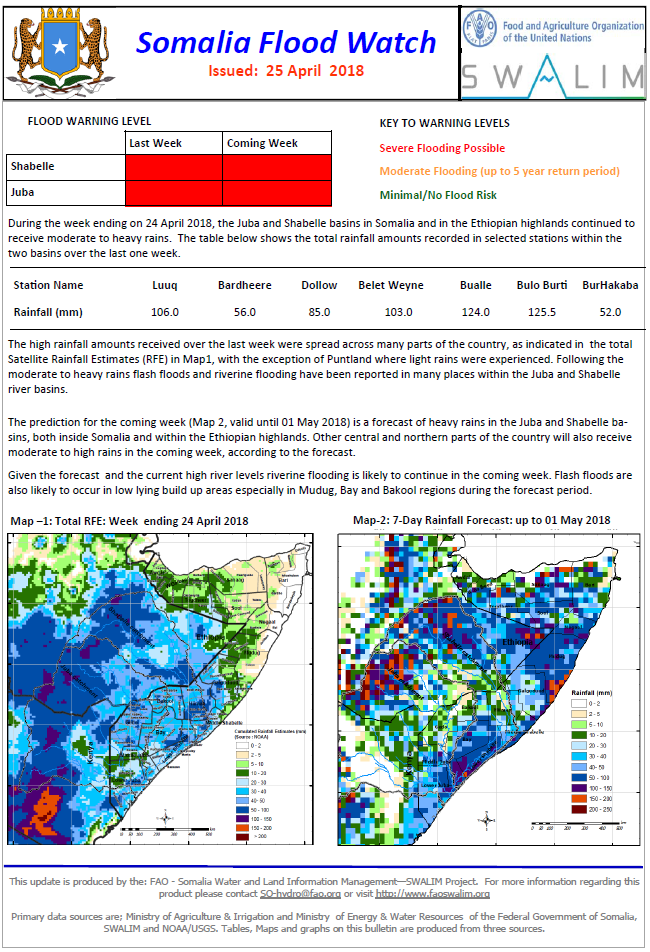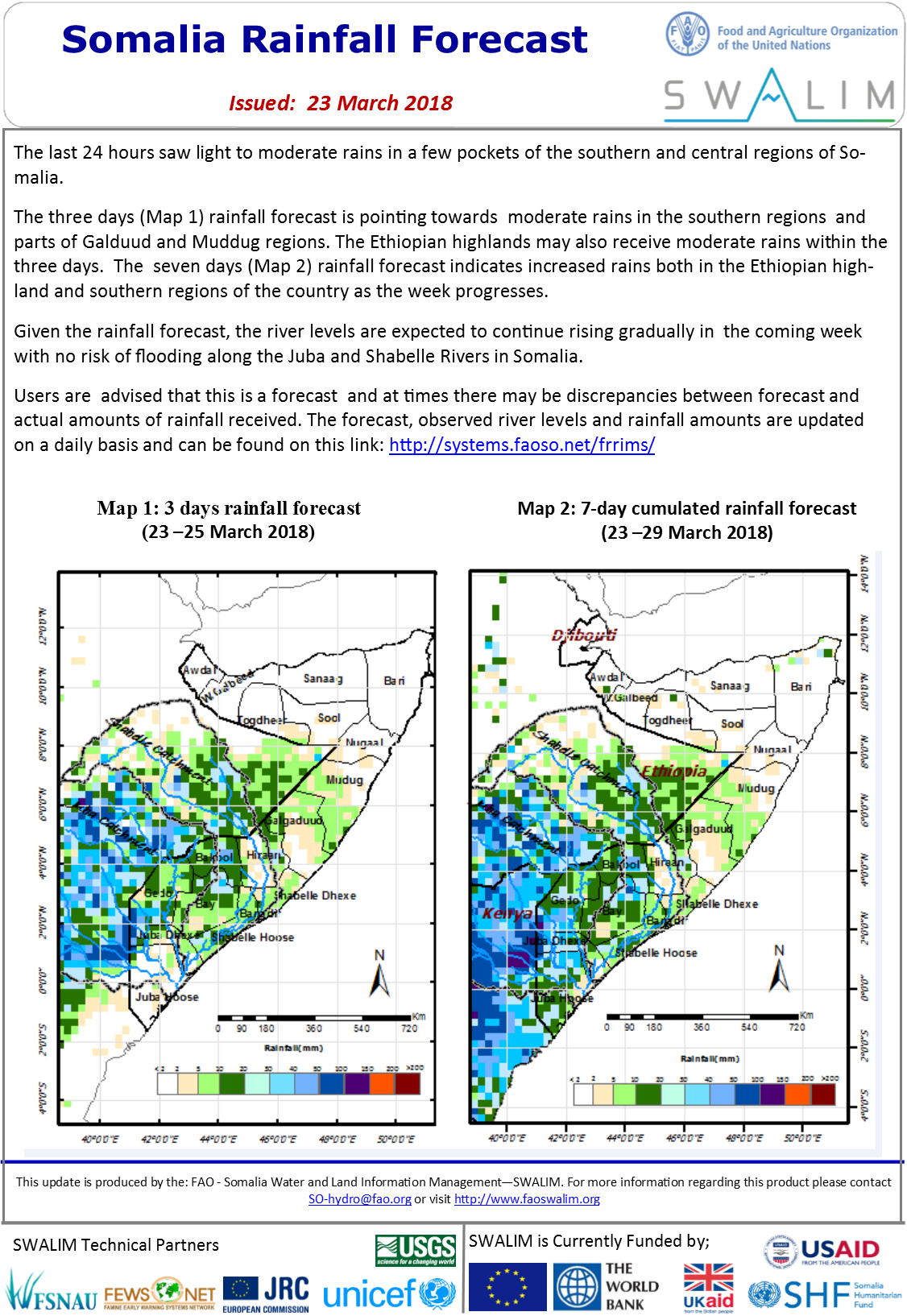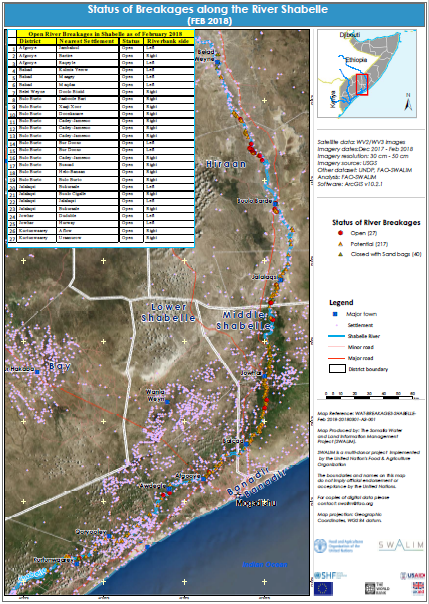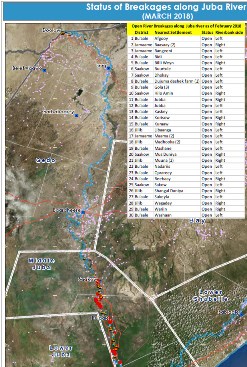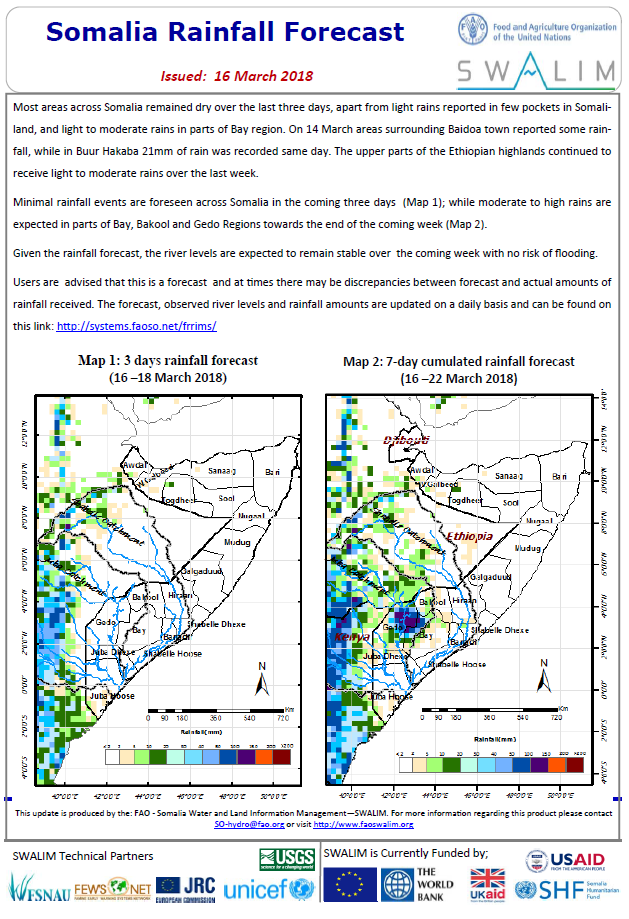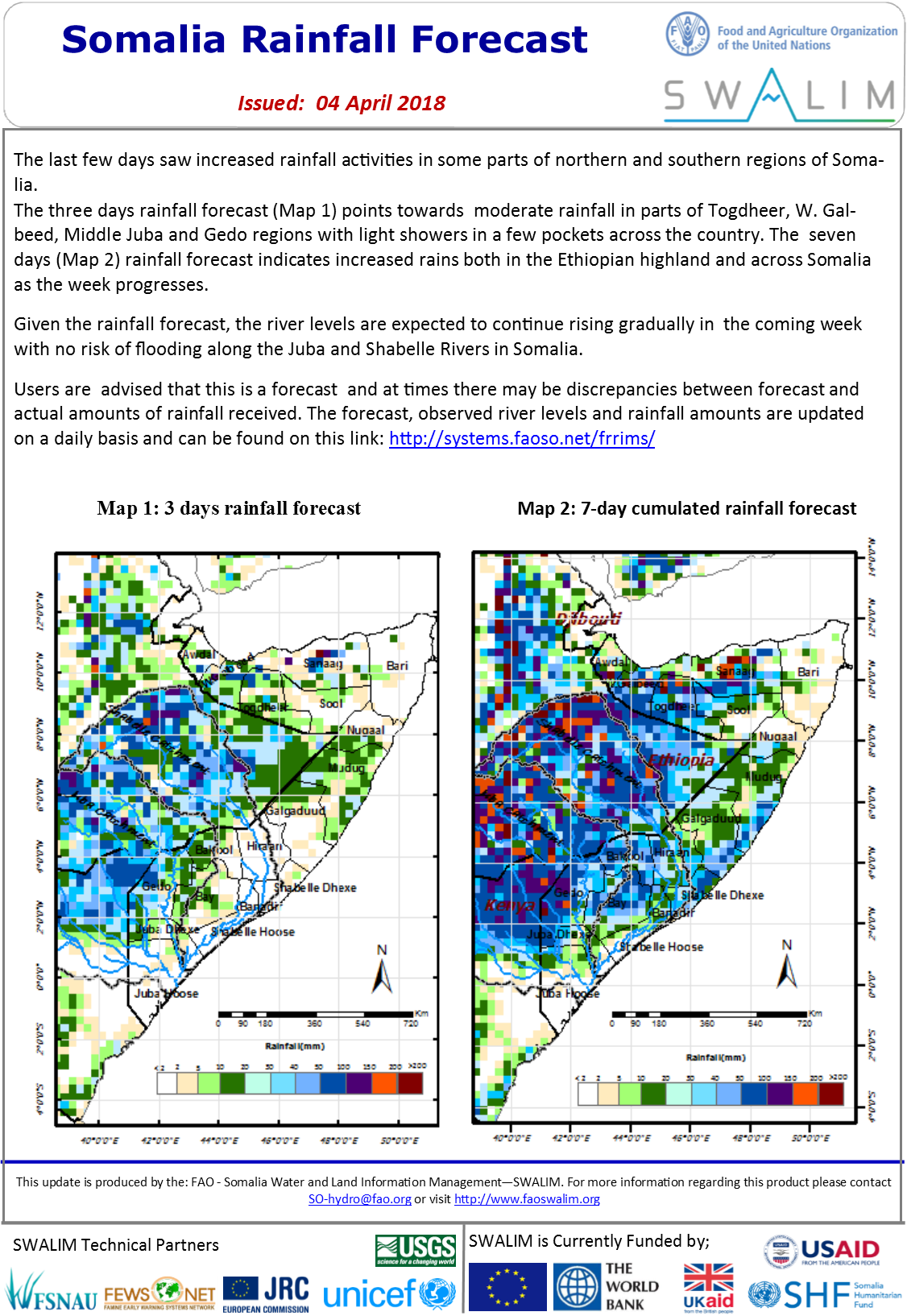Library Catalog
Latest Documents and Publications listed. Use search terms in the box below to find what you need
Somalia Flood Watch Bulletin - Issued 25 April 2018
During the week ending on 24 April 2018, the Juba and Shabelle basins in Somalia and in the Ethiopian highlands continued to receive moderate to heavy rains.
The high rainfall amounts received over the last week were spread across many parts of the country, as indicated in the total Satellite Rainfall Estimates (RFE) in Map1, with the exception of Puntland where light rains were experienced. Following the moderate to heavy rains flash floods and riverine flooding have been reported in many places within the Juba and Shabelle river basins.
The prediction for the coming week (Map 2, valid until 01 May 2018) is a forecast of heavy rains in the Juba and Shabelle basins, both inside Somalia and within the Ethiopian highlands. Other central and northern parts of the country will also receive moderate to high rains in the coming week, according to the forecast.
Given the forecast and the current high river levels riverine flooding is likely to continue in the coming week. Flash floods are also likely to occur in low lying build up areas especially in Mudug, Bay and Bakool regions during the forecast period.
Publication Type:
Flood watch bulletin
Publication Date:
Author:
Corporate Author:
Somalia Rainfall Forecast - Issued 04 may 2018
Enhanced rains are foreseen in the coming week in many parts of the country with Bay and Bakool regions in the south expected to record the highest amounts of rainfall. The Ethiopian highlands will also continue to receive good rains during the period in forecast.
The foreseen moderate to heavy rains are likely to exacerbate ground conditions, and trigger additional floods. Built up and low Lying areas of Bay and Bakool will experience flash floods while river flooding along the Juba and Shabelle Rivers will continue.
Publication Type:
Rainfall Forecast
Publication Date:
Author:
Corporate Author:
Somalia Rainfall Forecast 21-03-2018
The Gu rainy season occurs in the period between March and June and is marked as the primary cropping season in Somalia. The season starts and ends at different times throughout the country. In the areas bordering Kenya, Middle Juba, northern parts of Middle Shabelle and the northwest corner of the country, the Gu rains starts as early as the second half of March. The rains then intensify in April all over the country. The length of the season also varies across the country from year to year.
Minimal rainfall events are foreseen across Somalia in the coming three days with Gedo and Bakool regions expected to record moderate rains. The rains will then spread further in the other southern regions in the course of the week with light to moderate intensity.
Given the rainfall forecast, the river levels are expected to remain stable over the coming week with no risk of flooding along the Juba and Shabelle Rivers in Somalia.
Publication Type:
Rainfall Forecast
Publication Date:
Author:
Corporate Author:
Somalia Rainfall Forecast 23-03-2018
The last 24 hours saw light to moderate rains in a few pockets of the southern and central regions of Somalia.
The three days rainfall forecast is pointing towards moderate rains in the southern regions and parts of Galduud and Muddug regions. The Ethiopian highlands may also receive moderate rains within the three days. The seven days rainfall forecast indicates increased rains both in the Ethiopian highlands and southern regions of the country as the week progresses.
Given the rainfall forecast, the river levels are expected to continue rising gradually in the coming week with no risk of flooding along the Juba and Shabelle Rivers in Somalia.
Publication Type:
Rainfall Forecast
Publication Date:
Author:
Corporate Author:
Status of River Breakages Along Shabelle Rivers as at Feb 2018
The Gu 2018 (April to June) rainfall forecast points towards near-normal to below-normal rains within the Juba and Shabelle River basin. However, flooding along the two rivers is likely to occur, especially in areas with open river banks/weak river embankments.
FAO SWALIM (Somalia Water and Land Information Management) has updated the status of the river breakages along the Shabelle River and is in the process of updating the Juba by mapping them using available Very High Resolution (VHR) satellite imagery and a Digital Elevation Model (DEM); supported by “ground truthing” field observations where feasible. All the observations reported refers to the latest suitable VHR satellite image available, which is indicated in the online database.
Four types of breakages have been identified, namely; open, potential, closed with sandbags and closed. The open breakages are those that are still open as observed on the latest VHR image available, therefore field verification is needed before planning any repair. The potential breakages represent points that have weak river embankments. The closed with sandbags points are defined here as those that been temporarily closed with sandbags making them still vulnerable for further breakages. The closed points are those that were previously open but have since been closed using heavy machinery or other methods, which prevents further flooding in the short term.
The attached map show the open, potential and closed with sandbags points along the Shabelle River. In summary, 27 open points were identified long the river. Several other points, which are either potential or temporarily closed with sandbags, have been identified.
The methodology is biased towards Remote Sensing (RS) interpretation with only limited “ground truthing” due to access constraints. Open breakages might have been omitted in some cases where satellite images may not have been very clear (e.g. heavy cloud cover) or were not available.
Maps of the status of river breakages, with detailed information, have been produced at large scale and can be obtained from SWALIM offices. This information is also available on the SWALIM Flood Risk and Response Management Information System portal.
Publication Type:
Technical report
Publication Date:
Author:
Corporate Author:
Status of River Breakages Along Juba River as at March 2018
As part of flood preparedness and contingency planning, the FAO Somalia Water and Land Information Management project (SWALIM) has finalized mapping of river breakages along the Juba River using Very High Resolution (VHR) satellite images. The middle and lower parts of the river are most vulnerable to flooding. Three types of breakages have been identified namely; open (37), potential (191) and closed with sand bags (21).
The open breakages are those that were still open during the period of investigation. The potential breakages represent points that have very weak river embankment or have experienced several breakages in the recent past. The closed with sand bags breakages are those that were previously open but efforts have been made to close them although they are still at risk. The open river breakages pose an immediate danger and high risk of flooding.
Publication Type:
Map
Publication Date:
Author:
Corporate Author:
Somalia Rainfall Forecast 13-03-2018
While the Gu season is yet to start in Somalia, light to moderate rains were reported in parts of Somaliland since the last week of February and first week of March. The upper parts of the Ethiopian highlands also recorded moderate rains during the last two weeks which led to slight increase of river levels along the Juba and Shabelle Rivers inside Somalia.
Light rains are foreseen in a few pockets of Bay and Bakool regions as well as western parts of Somaliland and the Ethiopian highlands in the coming three days (Map 1). The rains are then expected to intensify in space and quantity towards the end of the week (Map 2). Given the rainfall forecast, the river levels are expected to rise with no risk of flooding.
Users are advised that this is a forecast and at times there may be discrepancies between forecast and actual amounts of rainfall received.
Publication Type:
Rainfall Forecast
Publication Date:
Author:
Corporate Author:
Somalia Rainfall Forecast 28-03-2018
The last few days saw light rains in some parts of northern and southern regions in the country. The three days rainfall forecast is pointing towards minimal rains with light showers expected in a few pockets of Sool, Gedo, Middle Juba and the southern coastal areas. The seven days rainfall forecast indicates increased rains both in the Ethiopian highland and southern regions of the country as the week progresses.
Given the rainfall forecast, the river levels are expected to continue rising gradually in the coming week with no risk of flooding along the Juba and Shabelle Rivers in Somalia.
Publication Type:
Rainfall Forecast
Publication Date:
Author:
Corporate Author:
Somalia Rainfall Forecast 16-03-2018
Most areas across Somalia remained dry over the last three days, apart from light rains reported in few pockets in Somaliland, and light to moderate rains in parts of Bay region. On 14 March areas surrounding Baidoa town reported some rainfall, while in Buur Hakaba 21mm of rain was recorded same day. The upper parts of the Ethiopian highlands continued to receive light to moderate rains over the last week.
Minimal rainfall events are foreseen across Somalia in the coming three days (Map 1); while moderate to high rains are expected in parts of Bay, Bakool and Gedo Regions towards the end of the coming week (Map 2). Given the rainfall forecast, the river levels are expected to remain stable over the coming week with no risk of flooding.
Publication Type:
Rainfall Forecast
Publication Date:
Author:
Corporate Author:
Somalia Rainfall Forecast 04-04-2018
The last few days saw increased rainfall activities in some parts of northern and southern regions of Somalia.
The three days rainfall forecast points towards moderate rainfall in parts of Togdheer, W. Galbeed, Middle Juba and Gedo regions with light showers in a few pockets across the country. The seven days rainfall forecast indicates increased rains both in the Ethiopian highland and across Somalia as the week progresses.
Given the rainfall forecast, the river levels are expected to continue rising gradually in the coming week with no risk of flooding along the Juba and Shabelle Rivers in Somalia.
Users are advised that this is a forecast and at times there may be discrepancies between forecast and actual amounts of rainfall received.
Publication Type:
Rainfall Forecast
Publication Date:
Author:
Corporate Author:
Pages
 RSS feed [compliant with the Agris AP] |
RSS feed [compliant with the Agris AP] |  Agris AP XML
Agris AP XML


